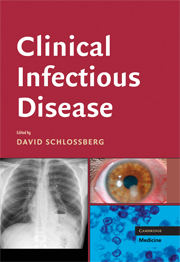Book contents
- Frontmatter
- Contents
- Preface
- Contributors
- Part I Clinical Syndromes – General
- Part II Clinical Syndromes – Head and Neck
- Part III Clinical Syndromes – Eye
- Part IV Clinical Syndromes – Skin and Lymph Nodes
- Part V Clinical Syndromes – Respiratory Tract
- Part VI Clinical Syndromes – Heart and Blood Vessels
- Part VII Clinical Syndromes – Gastrointestinal Tract, Liver, and Abdomen
- Part VIII Clinical Syndromes – Genitourinary Tract
- Part IX Clinical Syndromes – Musculoskeletal System
- Part X Clinical Syndromes – Neurologic System
- Part XI The Susceptible Host
- 83 Evaluation of Suspected Immunodeficiency
- 84 Infections in the Neutropenic Patient
- 85 Infections in Patients with Neoplastic Disease
- 86 Corticosteroids, Cytotoxic Agents, and Infection
- 87 Infections in Transplant Patients
- 88 Diabetes and Infection
- 89 Infectious Complications in the Injection Drug User
- 90 Infections in the Alcoholic
- 91 Infections in the Elderly
- 92 Neonatal Infection
- 93 Pregnancy and the Puerperium: Infectious Risks
- 94 Dialysis-Related Infection
- 95 Overwhelming Postsplenectomy Infection
- Part XII HIV
- Part XIII Nosocomial Infection
- Part XIV Infections Related to Surgery and Trauma
- Part XV Prevention of Infection
- Part XVI Travel and Recreation
- Part XVII Bioterrorism
- Part XVIII Specific Organisms – Bacteria
- Part XIX Specific Organisms – Spirochetes
- Part XX Specific Organisms – Mycoplasma and Chlamydia
- Part XXI Specific Organisms – Rickettsia, Ehrlichia, and Anaplasma
- Part XXII Specific Organisms – Fungi
- Part XXIII Specific Organisms – Viruses
- Part XXIV Specific Organisms – Parasites
- Part XXV Antimicrobial Therapy – General Considerations
- Index
90 - Infections in the Alcoholic
from Part XI - The Susceptible Host
Published online by Cambridge University Press: 05 March 2013
- Frontmatter
- Contents
- Preface
- Contributors
- Part I Clinical Syndromes – General
- Part II Clinical Syndromes – Head and Neck
- Part III Clinical Syndromes – Eye
- Part IV Clinical Syndromes – Skin and Lymph Nodes
- Part V Clinical Syndromes – Respiratory Tract
- Part VI Clinical Syndromes – Heart and Blood Vessels
- Part VII Clinical Syndromes – Gastrointestinal Tract, Liver, and Abdomen
- Part VIII Clinical Syndromes – Genitourinary Tract
- Part IX Clinical Syndromes – Musculoskeletal System
- Part X Clinical Syndromes – Neurologic System
- Part XI The Susceptible Host
- 83 Evaluation of Suspected Immunodeficiency
- 84 Infections in the Neutropenic Patient
- 85 Infections in Patients with Neoplastic Disease
- 86 Corticosteroids, Cytotoxic Agents, and Infection
- 87 Infections in Transplant Patients
- 88 Diabetes and Infection
- 89 Infectious Complications in the Injection Drug User
- 90 Infections in the Alcoholic
- 91 Infections in the Elderly
- 92 Neonatal Infection
- 93 Pregnancy and the Puerperium: Infectious Risks
- 94 Dialysis-Related Infection
- 95 Overwhelming Postsplenectomy Infection
- Part XII HIV
- Part XIII Nosocomial Infection
- Part XIV Infections Related to Surgery and Trauma
- Part XV Prevention of Infection
- Part XVI Travel and Recreation
- Part XVII Bioterrorism
- Part XVIII Specific Organisms – Bacteria
- Part XIX Specific Organisms – Spirochetes
- Part XX Specific Organisms – Mycoplasma and Chlamydia
- Part XXI Specific Organisms – Rickettsia, Ehrlichia, and Anaplasma
- Part XXII Specific Organisms – Fungi
- Part XXIII Specific Organisms – Viruses
- Part XXIV Specific Organisms – Parasites
- Part XXV Antimicrobial Therapy – General Considerations
- Index
Summary
Acute and chronic alcohol ingestion exert direct and indirect effects on host defenses against infection (Table 90.1). Recent studies suggest that the immunotoxic effects of ethanol are due to direct cytotoxicity and to a shift in the balance of cytokines produced from the proinflammatory to more immunoinhibitory products. However, the adverse effects of ethanol itself may be indistinguishable from those due to concomitant cirrhosis, malnutrition, poor hygiene, adverse living conditions, and abuse of tobacco and other drugs. This discussion includes infections associated with increased frequency or severity in patients who abuse alcohol (Table 90.2). The suggested antibiotic dosages are for adult patients with normal renal function. Therapeutic decisions always should be made with the knowledge that alcoholic liver disease can interfere with the metabolism and excretion of certain antiinfective agents and that some antimicrobials can cause or exacerbate hepatic dysfunction.
PNEUMONIA
Bacterial pneumonia usually follows aspiration of oropharyngeal flora into the lungs. Severe intoxication is associated with altered consciousness and a diminished cough reflex. Elevated ethanol levels can interfere with cilial function on the surface of respiratory epithelial cells. Most alcoholics also smoke cigarettes, which further impairs mucociliary defenses against infection of the respiratory tract. The most frequent bacterial causes of pneumonia in ethanol abusers include Streptococcus pneumoniae, anaerobes, aerobic gram-negative bacilli, and Haemophilus influenzae. Standard diagnostic approaches are used to evaluate alcoholic patients who exhibit signs or symptoms of pneumonia.
- Type
- Chapter
- Information
- Clinical Infectious Disease , pp. 637 - 642Publisher: Cambridge University PressPrint publication year: 2008



